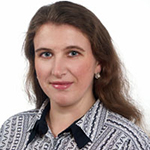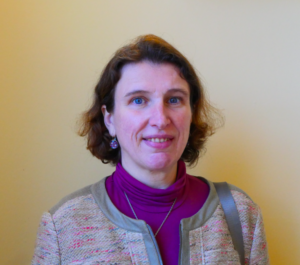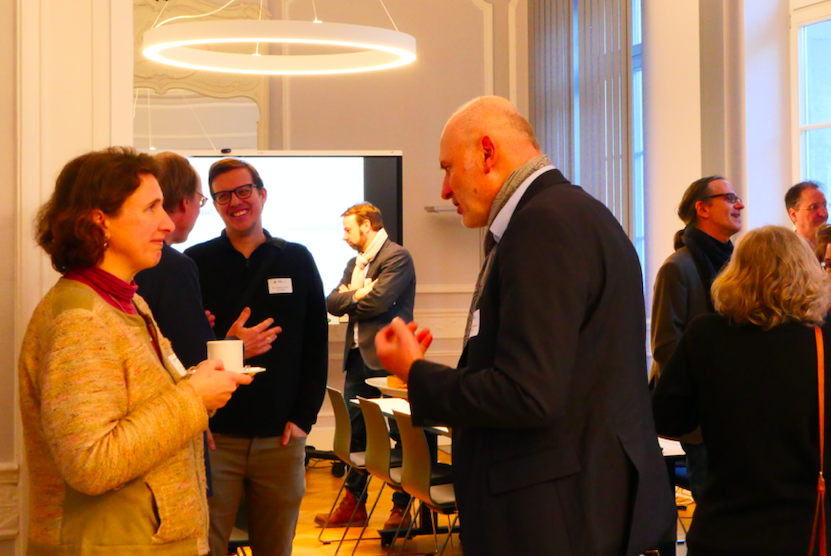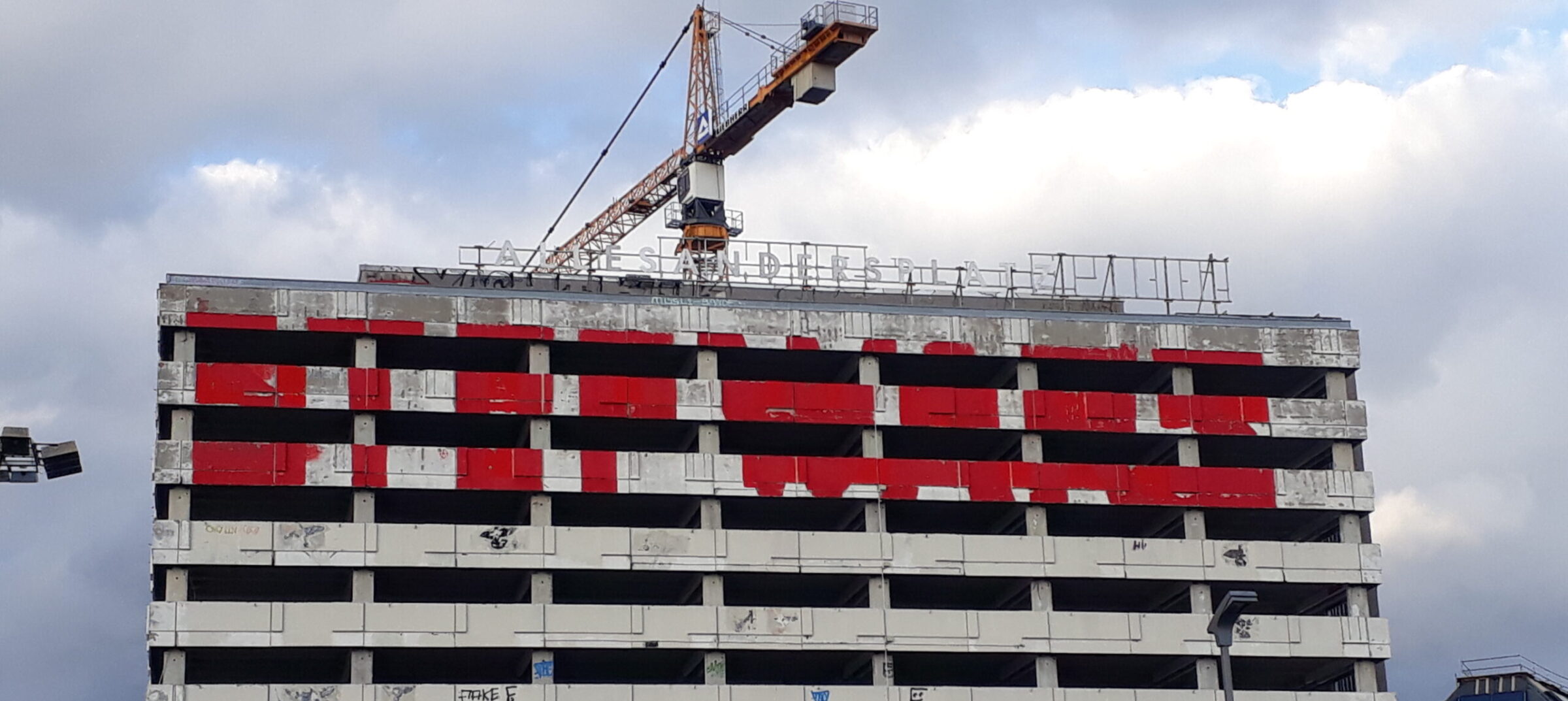For over a year now the war is raging in Ukraine. Anna Laktionova and Svitlana Shcherbak, two philosophers from Kiev, left after the invasion. They are fellows at c:o/re, an advanced studies center at RWTH Aachen University that focuses on different research cultures and how they change in times of global challenges and transformations. War can have an impact on research, too. It first of all threatens and takes lives and destroys homes – but it can also radically change the scholarly landscape. Concidering the terror against civilians, I was hesitating for a long time to ask Anna and Svitlana about research in times of war, but I finally approached them and asked if they would be open to talk about their experiences during the past year. They agreed, although they both told me how tough and challenging it was to speak about this. I am very greatful that they shared their personal stories and professional perspectives.

Anna Laktionova
Anna Laktionova is Professor of the Department of Theoretical and Practical Philosophy at Taras Shevchenko National University of Kyiv, Ukraine. Among other topics, such as theory of knowledge, and the legacy of Ludwig Wittgenstein, she explores the reciprocally additive character of the relation between “is” and “ought”. In her research project as a c:o/re fellow, Anna explores the possibilities of engaging Philosophy of Technology and Philosophy of Science with Philosophy of Action and Agency.
Stefanie Haupt: I remember waking up in the morning of the 24th of February 2022 to the news of Russia invading Ukraine. Although in retrospect everything pointed towards it – the occupation of Crimea in 2014, the weeks and days leading up to the war, the escalating rhetoric and actions – I was still shocked and could not believe it was actually happening. Looking back, I think that was naïve maybe. When did you become certain that the Russian government was serious about attacking Ukraine? How did you experience the weeks before, the day of the invasion and the weeks following it? What were your thoughts and when did you decide to leave?
Anna Laktionova: Even at 4.00 a.m. on the 24th of February 2022, early morning, when I was not able to fall asleep and I had been watching different news and information on the internet, I could not believe it to be possible. But then after two hours I woke up by the call from my brother telling me that there was already bombing of the North of Kyiv.

Since February, 7th, 2022, Vera, my 1-year-old daughter, my husband, and his mother (my mother-in-law, 82 years old) had already been in a rented flat in Uzhgorod (a nice town in the Western part of Ukraine, about 900 km from Kyiv). We had planned to spend half of the year there (the nature, climate etc. is very nice). But we also had a weird intuition about the Russian attack. We thought it would be much easier if I joined my family later than running away from Kyiv all together. As Covid was still spreading at that time, my teaching in the University was online, so I intended to join the family as soon as I felt ok – I did not feel well after I stopped breastfeeding Vera. So, no one in my family believed in a real possibility of war; but we had some intuitions, discussed them and decided not to risk our only child’s safety.
On the 24th of February 2022 at 8.00 a.m., I was already driving a car to Western Ukraine. I don’t have a car; from 6.00 till 7.45 I had been calling everyone of my close and not-so-close friends asking about the possibility to join someone who was heading West, explaining that I was alone, no luggage, just a knapsack (I took just documents, available money; not thinking about anything – even forgot my glasses as I was wearing contact lenses); and that I can drive (I have a driver’s license but no experience in driving as I don’t own a car anymore). Some friends of friends of friends had a car and old parents whom they wanted to send to the West, so I drove them to the small town Stryi close to the Carpathians. The road was extremely busy, the speed was mostly about 20 to 50 km per hour; it took us a bit more than 24 hours to get there. From there I got to Uzhgorod by local trains… On the way from Kyiv to the West, I saw Russian helicopters, aircrafts…
After a few days the possibility of a fellowship in KHK c:o/re Aachen opened up and I accepted it. I am very thankful to many foreign colleagues for trying to find ways of helping me! Me, my daughter, my mother-in-law, we crossed the border between Ukraine and Slovakia by foot on the 4th of March (no cars were allowed to pass through). My former classmates (who emigrated to Germany about 10 years ago) picked us up on the Slovakian side and we drove to Germany. On the border the situation was ‘very touching’: many men were accompanying women with children, helping with the luggage to the point of crossing the border, kissing, crying, and remaining on the Ukrainian side…
Stefanie: I can hardly imagine how much stress and uncertainty you must have experienced during this time. Did you manage to settle in and find routines at RWTH and in the city of Aachen? How did your professional life as a philosopher change? How does the war impact your research?
Anna: In Aachen, colleagues and staff from KHK c:o/re and RWTH were very kind and supportive (to name just a few: Gabriele Gramelsberger, Ana de la Varga, Julia Arndt). They and their friends helped us with everything: documents, finding a place to stay and live (the family of the owners of a flat where we live, the neighbours are also incredibly kind and caring), explaining about peculiarities of German institutions (the situation has also been challenging for them) and habits, also with finding a kindergarden for Vera (but she still doesn’t stay for more than one hour there without me) etc. etc. etc. I remember that in March and April on the streets I was meeting more and more Ukrainian women and children every day… Our situation in Aachen has been lucky enough. We are very thankful to many German people for the help, support, care!
My personal life has been and still is very much engaged with my daughter. It influences my professional life, my daughter is the first priority to me. Everything has been and still is not easy. I cannot participate in the professional life as much as I would like to and as I used to. The fellowship opened up new interesting very promising paths for my investigations, but I cannot accomplish them as largely as I want due to my personal situation.

Stefanie: Do you have colleagues in your private and professional network that work at research institutions and universities in Ukraine? Do you know how the situation is for them? I know that you are also still teaching online. How is the situation for your students?
Anna: Colleagues in Ukraine are holding on. Everything is online, sometimes not online but by email correspondence because of problems with electricity, internet, unsafety, air raid alerts… Many of them are helping to support the Ukrainian Army…
Officially, being a fellow, I don’t have to teach, but I am continuing to supervise some post-graduate students and future magisters. I was also asked by the administration of the faculty from Kyiv to continue teaching some of my courses online, which I do. Some students are outside Ukraine, some stay at home, often not in Kyiv. Meeting online is not always successful: air alarms happen at different times and in different districts of Kyiv and parts of Ukraine. Often the communication is by e-mail correspondence and individual zoom-meetings. Some students are at war, some volunteer in the helping infrastructure. Last year, I was member in several PhD and Doctor of Science committees. Scientific life somehow goes on…
Stefanie: Thank you so much, Anna, for sharing very difficult and personal experiences!
One Comment on “Research in Times of War – “Scientific Life Somehow Goes on…””
Leave a Reply
You must be logged in to post a comment.




Pingback: c:o/re Highlights of 2023: A look back